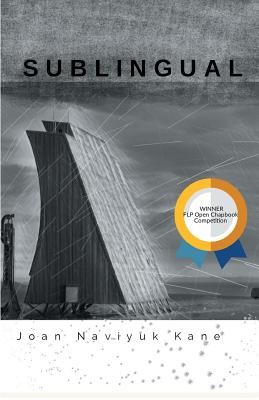
- We will send in 10–14 business days.
- Author: Joan Naviyuk Kane
- Publisher: Finishing Line Press
- Year: 2018
- Pages: 36
- ISBN-10: 1635347696
- ISBN-13: 9781635347692
- Format: 14 x 21.6 x 0.2 cm, softcover
- Language: English
- SAVE -10% with code: EXTRA
Reviews
Description
Joan Kane's chapbook Sublingual dissolves under the tongue like a pill, a medicine that tastes like melting glaciers and displaced cultures, except it doesn't solve, it only soothes, and it's a complicated soothing, making distinctions been "stress puking" and "party puking," which like the poems here enact a push-and-pull of modes: urgent warnings and sinuous meditations and letters to friends and fragments of stories. It's a fresh introduction to this important and exciting poet's work. In Sublingual, Joan Kane is an Arctic Rimbaud who sees images of vivid defeat and unlikely persistence, and "inflects them with purpose," investigating "how many rules of the brute's brutish language" she can "break in one poem," pursuing dark passages and open waters, disappearing forests, with a head "in its fine blank way an original," an adventuring Alice pursuing "what is left of the woods...what is left of me."
Ed Skoog
The poems in Joan Kane's Sublingual don't flinch, display a fist. If a fist can be a heart and the arrow through it a pen. Kane's images and language arrest and attest to a future, a present, a past that is melting against "vehement light." There's no need for fret or worry, however. However, it's time to take note, to look back at what's looking at you. Breathe these poems, be at mercy to the wind.
Bojan Louis, author of Currents
In Sublingual, Kane creates an earth on which all things are evidently their own opposites, endless and utterly bereft. These poems are catchy and thrilling and expose the violence of time and, inside it, our human vibrancy and violence. Every line--every word--is unexpected and exactly right. An encapsulation of a white landscape that bursts its capsule and gleams a thousand hues.
Jennifer Croft
Joan Naviyuk Kane is the author of poetry and prose collections including The Cormorant Hunter’s Wife (2009), Hyperboreal (2013), The Straits (2015), Milk Black Carbon (2017) and, A Few Lines in the Manifest (2018). Forthcoming in 2018 is Sublingual (November), and in 2019, Another Bright Departure. Works in progress include Dark Traffic, A Field Guide to Contemporary Native Poetics, Innuŋuaq, and an autobiographical nonfiction essay collection. Joan Naviyuk Kane is Inupiaq with family from King Island (Ugiuvak) and Mary’s Igloo, Alaska. She was raised in and attended public school in Anchorage, where she currently raises her sons as a single mother. Kane graduated with honors from Harvard College, where she was a Harvard National Scholar, and Columbia University’s School of the Arts, where she was the recipient of a graduate Writing Fellowship.
EXTRA 10 % discount with code: EXTRA
The promotion ends in 18d.12:27:37
The discount code is valid when purchasing from 10 €. Discounts do not stack.
- Author: Joan Naviyuk Kane
- Publisher: Finishing Line Press
- Year: 2018
- Pages: 36
- ISBN-10: 1635347696
- ISBN-13: 9781635347692
- Format: 14 x 21.6 x 0.2 cm, softcover
- Language: English English
Joan Kane's chapbook Sublingual dissolves under the tongue like a pill, a medicine that tastes like melting glaciers and displaced cultures, except it doesn't solve, it only soothes, and it's a complicated soothing, making distinctions been "stress puking" and "party puking," which like the poems here enact a push-and-pull of modes: urgent warnings and sinuous meditations and letters to friends and fragments of stories. It's a fresh introduction to this important and exciting poet's work. In Sublingual, Joan Kane is an Arctic Rimbaud who sees images of vivid defeat and unlikely persistence, and "inflects them with purpose," investigating "how many rules of the brute's brutish language" she can "break in one poem," pursuing dark passages and open waters, disappearing forests, with a head "in its fine blank way an original," an adventuring Alice pursuing "what is left of the woods...what is left of me."
Ed Skoog
The poems in Joan Kane's Sublingual don't flinch, display a fist. If a fist can be a heart and the arrow through it a pen. Kane's images and language arrest and attest to a future, a present, a past that is melting against "vehement light." There's no need for fret or worry, however. However, it's time to take note, to look back at what's looking at you. Breathe these poems, be at mercy to the wind.
Bojan Louis, author of Currents
In Sublingual, Kane creates an earth on which all things are evidently their own opposites, endless and utterly bereft. These poems are catchy and thrilling and expose the violence of time and, inside it, our human vibrancy and violence. Every line--every word--is unexpected and exactly right. An encapsulation of a white landscape that bursts its capsule and gleams a thousand hues.
Jennifer Croft
Joan Naviyuk Kane is the author of poetry and prose collections including The Cormorant Hunter’s Wife (2009), Hyperboreal (2013), The Straits (2015), Milk Black Carbon (2017) and, A Few Lines in the Manifest (2018). Forthcoming in 2018 is Sublingual (November), and in 2019, Another Bright Departure. Works in progress include Dark Traffic, A Field Guide to Contemporary Native Poetics, Innuŋuaq, and an autobiographical nonfiction essay collection. Joan Naviyuk Kane is Inupiaq with family from King Island (Ugiuvak) and Mary’s Igloo, Alaska. She was raised in and attended public school in Anchorage, where she currently raises her sons as a single mother. Kane graduated with honors from Harvard College, where she was a Harvard National Scholar, and Columbia University’s School of the Arts, where she was the recipient of a graduate Writing Fellowship.


Reviews